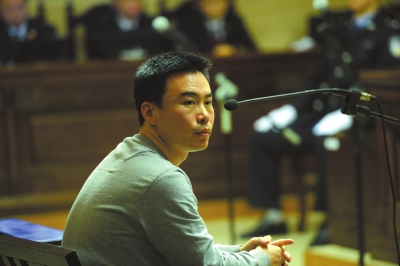Balance sought between innovation, public morality

Wang Xin, CEO of Qvod Technology, stands trial in Beijing on Jan. 7. The impact of the open trial has spread beyond the courtroom, leading to a public discussion on the ethics of technology.
The recent trial of Qvod Technology CEO Wang Xin on charges that his company’s video player was used to spread pornography has prompted many to ponder ways legislation and the judicial system can keep pace with rapid changes in Internet technology. How should we use Internet technology as a tool to make our lives more convenient without hurting public morality? The Qvod case is a great example of judicial practice.
Features of Qvod case
Millions followed the trial online, leading to a public debate about Internet technology and the rule of law. Ran Jingfu, an associate research fellow from the Institute of Law at the Chinese Academy of Social Sciences, said the amount of public attention paid to the trial reflects the enormous number of Internet users and the advanced state of communication technology. Its impact has spread beyond the courtroom into the public vision.
Zhu Wei, deputy director of the Center of Communication Law at China University of Political Science and Law, argued that advanced forms of communication, the “Internet Plus” strategy and the public court proceedings enabled more people to see this trial. This represents a breakthrough in China’s judicial reform rooted in the spirit of the rule of law, Zhu said. The massive attention paid to this trial has exceeded the expectations of judicial bodies and scholars, he said.
“The case has charted the course for Internet development. It is a precedent about ethics and law for future cases,” said Chen Jialin, a professor from the School of Law at Wuhan University. Because the court was open to the public, the proceedings enabled laymen to gain a better understanding of abstract legal concepts. As a result, a public discourse on the highlighted problems has taken shape, Chen said.
Technology no excuse
In the trial, Wang argued that “technology is innocent” in his defense. In response, Jiang Jun, spokesperson of the Cyberspace Administration of China, said all websites should bear legal responsibility for their content. “Practices of regulating, operating and using the Internet must be in accordance with relevant laws,” he argued. This has become a consensus in the Internet industry and the community. No one has the right to violate it, Jiang said.
“The sentence ‘technology is innocent’ itself is reasonable. But as a defense, he distorted the concept,” Zhu said. The problem lies in the application of technology rather than technology itself. Ignoring the law, Qvod downloaded resources to its own server and recommended them, directly or indirectly, to a third party. In this process, Qvod acted as a distributor and its behavior constituted an abuse of technology, Zhu elaborated.
Chen said the Qvod case, to some extent, challenges China’s theory on criminal law. As an online video player and storage space provider, Qvod is neutral. But there is the possibility that neutral behaviors may lead to crimes. Due to the uniqueness of the Internet, the validity of the defense should be further analyzed in two regards. Wang is likely to be found guilty if the prosecutor could prove he did it on purpose, and the company’s conscious actions or negligence permitted criminal behavior to occur.
“The question of technology neutrality began with the Sony case and continued with the Napster case in America and it will always be pondered,” Zhu said. The central issues include how to uphold or overrule defenses based on technology neutrality. However it is clear that disguising composite and peer-to-peer technologies is forbidden. Investigations should probe how technology can be abused to achieve illegal benefits and facilitate criminal conduct. Technology neutrality is at the center of the Qvod case, but there are other aspects as well, Zhu said.
Responsible innovation
The Qvod case has been resolved, but reflection on it continues. The Internet tolerates no chaos and lawless behavior. Its governance requires the rule of law and responsible innovation in particular. Companies should understand the consequences before researching new technologies. Meanwhile, they should abide by the ethics of technology and never take advantage of loopholes in a law.
The Qvod case will be a landmark for Internet regulations. Its future influence on China’s Internet industry will be huge. Chen argued that the case is a teachable moment for society and academia. It is important to balance the fight against crime and the development of technology. With academic discussions, theoretical progress in criminal law will be made, Chen said.
Zhu added it is necessary to strengthen Internet governance. First, legal, ethic and social responsibilities of companies must be clarified. Second, enterprises must agree to a joint pledge on industrial regulations so industry self-discipline could fill the legal vacuum. Meanwhile, open trials are only the first step toward a completely transparent judicial system. The judicial bodies should immediately respond to any concerns and hold lectures to educate the public on the law. In addition, the Qvod case has exposed certain backward aspects of China’s legal regulations. The mature principles shaped over the recent years should be codified.
Ran said that the Qvod case offers us more guidance as to what to do and what to think. All should learn from the case, and laws and regulations need to be improved, he said. In addition to augmenting their professional skills, judicial officials need to keep pace with new technology. Academics should continue to work on theoretical research, and the Internet companies must pay more attention to similar technology. These requirements go beyond the case itself. Thus, the Internet will embrace healthy development, Ran said.
Zhang Fan is a reporter at the Chinese Social Sciences Today.
